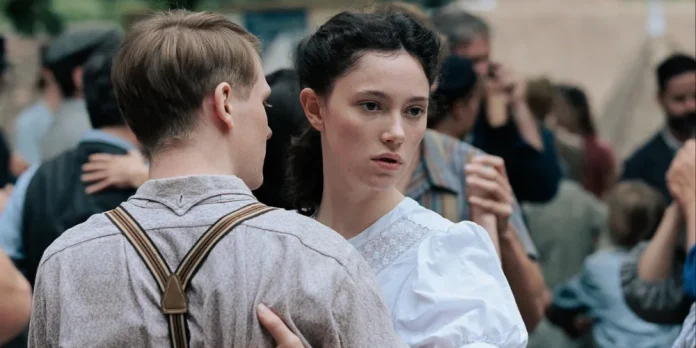THE STORY – Fifteen-year-old Emma – pregnant after a rape – defies her repressive rural Protestant community to carve a path of self-determination. She transforms trauma into a catalyst for emancipation while confronting the moral hypocrisy of the village and the spectre of World War II around her.
THE CAST – Lila Gueneau, Grégoire Colin, Thomas Doret, Aurélia Petit, Sandrine Blancke, Sasha Gravat Harsch & Cyril Metzger
THE TEAM – Marie-Elsa Sgualdo (Director/Writer) & Nadine Lamari (Writer)
THE RUNNING TIME – 96 Minutes
In a world where women’s voices are often constrained by social expectations, Marie-Elsa Sgualdo’s “Silent Rebellion” tells the story of one young woman’s quiet but determined struggle for autonomy. Set in 1943 in a remote Swiss village near the German border, the film follows 17-year-old Emma (Lila Gueneau) as she confronts a life dictated by tradition, religion, and societal pressures. While the backdrop is wartime Switzerland, the story resonates far beyond its historical setting, portraying the subtle yet profound ways individuals resist oppression and claim agency over their own lives.
From the opening scenes, the film establishes the weight of the social and moral frameworks shaping Emma’s world. Abandoned by her mother, Alice (Sandrine Blancke), Emma assumes responsibility for her younger sisters while working as a domestic for the local pastor. Her life is bound by rigid expectations, from the nomination for the village’s “Virtue Prize” to the narrowly defined roles for women. This delicate balance is shattered when Emma is assaulted by Louis (Cyril Metzger), a visiting bourgeois youth, forcing her to navigate an impossible set of moral, social, and personal challenges.
What follows is a narrative of understated defiance. Emma’s rebellion is subtle, expressed through acts both personal and discreet: secret reading, withheld truths, and ultimately, the careful navigation of her pregnancy. Sgualdo captures the power of these seemingly small choices, emphasizing that real emancipation often grows from persistence and subtlety rather than dramatic gestures. The film becomes a meditation on resilience, honoring both Emma’s courage and the many women whose quiet actions shape history without fanfare. The heart of “Silent Rebellion” lies in Lila Gueneau’s remarkable performance. She portrays Emma’s inner strength with a balance of vulnerability and quiet determination, making her a compelling anchor for the film. Thomas Doret as Paul provides a stabilizing presence, embodying support without overshadowing Emma’s journey, while Grégoire Colin and Sandrine Blancke add depth to the generational and social dynamics that inform Emma’s choices. Together, the cast creates a believable, emotionally rich world.
Sgualdo’s direction emphasizes historical authenticity and emotional subtlety. Switzerland’s neutrality during World War II is portrayed not as a shield but as a backdrop for moral compromise, where villagers collude with German authorities to turn over Jewish refugees. Religion, too, shapes the community’s expectations of women, while the pastor becomes an unintentional guide for Emma’s emancipation. Through careful mise-en-scène and close attention to gesture and expression, the film communicates Emma’s internal journey as vividly as any dialogue could.
From a visual standpoint, “Silent Rebellion” embraces a restrained aesthetic that mirrors Emma’s quiet resilience. The muted palette of the Swiss countryside evokes both isolation and endurance, while temporal ellipses compress the story without losing clarity. Every gesture, glance, and decision is imbued with weight, allowing Sgualdo to convey Emma’s inner life without relying on overt dramatics. The visual choices support the narrative’s focus on subtle, cumulative acts of defiance, creating a nuanced portrait of a young woman carving out autonomy in a society designed to constrain her.
“Silent Rebellion” emerges as a quietly powerful debut that celebrates resilience and agency. By balancing historical precision, psychological insight, and thematic depth, Sgualdo has crafted a film that resonates far beyond its 1940s setting. It is a meditation on courage, personal choice, and the slow accumulation of small acts of resistance, revealing the enduring impact of individual determination in the face of rigid social norms.


